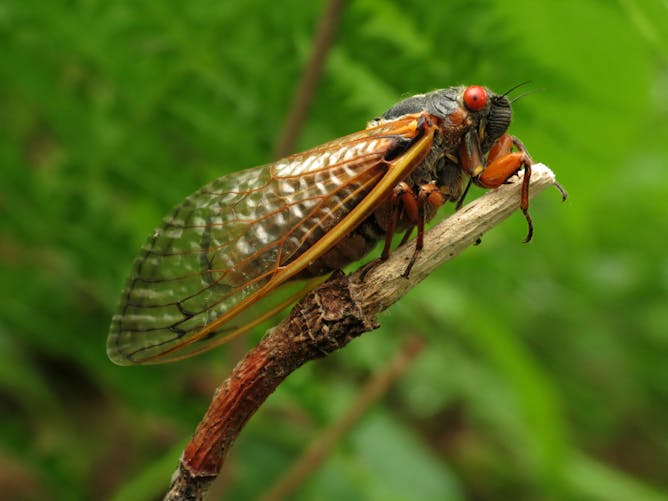|
It sounds like the plot of a new Marvel movie – Brood X is emerging! But this is real: the return of one of the largest groups of 17-year cicadas in North America. Brood X last appeared in 2004. Starting sometime in April, the next generation of cicadas will fill trees with rasping, buzzy trills across a dozen Eastern and Midwestern states.
University of Connecticut ecologists John Cooley and Chris Simon study cicadas to learn about the evolution, natural history and geographic distribution of life. And if you live in Brood X territory, they welcome your help documenting where and when the cicadas emerge. Of course, there’s an app for that.
This week we also liked articles about daylight saving time and the importance of getting enough sleep, a reason healthy, affordable food options are limited in many low-income and Black neighborhoods and the social and cognitive benefits of playing video games.
|

Periodical cicada in Washington, D.C., May 2017.
Katha Schulz/Flickr
John Cooley, University of Connecticut; Chris Simon, University of Connecticut
One of the largest groups of 17-year cicadas, Brood X, last emerged from underground in 2004. The next generation will arrive starting in April.
|

Nurse Nicole Chang celebrates after receiving one of the first injections of the COVID-19 vaccine Dec. 16 at Ronald Reagan UCLA Medical Center in Westwood, California.
Brian van der Brug/Getty Images
William Petri, University of Virginia
Millions of vaccinated people have been waiting for guidelines on what they can do safely. The CDC says it's OK to gather with other vaccinated people, but it's still best to avoid travel.
|

Sleep loss was an issue even before COVID-19.
Thurston Hopkins/Picture Post/Hulton Archive via Getty Images
Michael S. Jaffee, University of Florida
Springing forward for daylight saving time will be especially hard this year due to sleep loss from COVID-19. Why does the US keep doing this?
|
|
|
-
Julian Agyeman, Tufts University
Discriminatory zoning and housing policies have concentrated poverty in urban America along racial lines. As a result, healthy, affordable food options are limited in many low-income and Black neighborhoods.
-
John Velez, Indiana University
Research shows multiple social and cognitive benefits of playing video games.
-
Rachel Hadas, Rutgers University - Newark
Hope does not ride alone. It has a companion: anxiety. A classics scholar who is a poet notes that, at what may be the end of a long and dark pandemic year, both are in evidence.
|
|